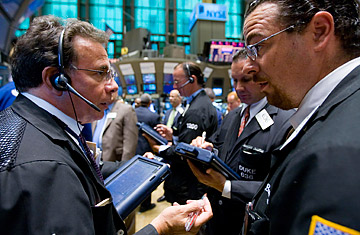
Correction appended: July 12, 2010.
Junk bonds are looking a lot less, well, junky.
Despite continued sluggishness in the economy and the rising talk of a double-dip recession, it appears that companies with poor credit are having a much easier time dealing with their debts. The annualized default rate among lower-rated companies has dropped to just 2%. That's down from 18% a year ago, and about half the historical average, according to Martin Fridson, chief credit strategist of BNP Paribas Asset Management.
"If you had said to anyone a year ago that the default rate was going to drop to where it is now, most people would have said that's an extreme forecast," says Fridson. "Some people would have called you nuts."
Fridson and others see the falling default rate on so-called junk bonds — Wall Street's term for debt issued by companies with poor credit ratings — as a sign that the economy is improving. In the past year, many companies that had been considered on the brink of bankruptcy have greatly improved their financial standing. The bonds of Neiman Marcus, for one, had fallen 41% in value on fears that lower consumer spending was going to make it impossible for the department-store chain to pay off its debts. Now consumers are spending again, and Neiman's earnings have rebounded. The company's bonds now trade at a 2% premium to their face value, or $1.02 per dollar the company has borrowed, up from $0.59 a year ago.
"It is certainly great news for the economy," says top economic forecaster Ed Yardeni. "Companies have done a good job of improving their finances, but they can't make all the bad things go away on their own."
Many investors, though, believe the drop in defaults will be temporary. Despite the low default rates, junk-bond prices have been falling in the past few months, and that as a result is pushing the yields on the bonds higher. These rich yields suggest that investors are nervous that more companies will default. According to Bank of America Merrill Lynch, 16.7% of corporate junk bonds, or 399 companies worldwide, are now trading at yields of 10% or more, up from 9.2% at the end of April. And the yields are particularly high, given that 10-year Treasury bonds recently traded at about 3%.
In a recent Goldman Sachs report, credit strategist Charles Himmelberg predicted that the default rate for risky companies would more than double in the second half of the year, to 5.3%. Himmelberg is worried that a slowdown in the economy from its already weak state will make it hard for companies to make money and pay their debts.
Another concern is that $700 billion in low-rated corporate bonds will be need to be refinanced from 2012 to 2014. Some are worried that if the credit markets remain relatively tight, many of those companies will have a difficult time getting new funds to pay off their old lenders. That, says Kevin Giddis, president of Morgan Keegan's fixed-income capital markets, is what is driving investors to demand high yields. "The market is doing what markets do," says Giddis. "It's looking past the current state of affairs and toward the future. With the maturity wall looming and no obvious way to avoid increasing defaults, the market doesn't really like what it sees."
For now, though, the news in the junk-bond market is surprisingly good. In the first six months of the year, just 20 U.S. companies with poor credit defaulted on their debts, according to bond-research firm Moody's. That's down sharply from 131 defaults a year ago. Fridson thinks the combination of plump yields and low-default rates may be creating an opportunity for investors. He says that by his measure, junk-bond yields are nearly double what they should be, meaning bond prices are likely to rise.
Still, when it comes to the economy, Fridson and other junk-bond experts caution against reading too much into the good news in the junk-bond market, noting that the unemployment rate is still high and GDP has been slowing. Just because companies can pay their debts doesn't mean they will be hiring workers anytime soon. Nevertheless, at the moment, the news out of the junk market is one of the few bright spots during a particularly gloomy period of economic developments.
"What it tells us is that fundamentally things are improving and that liquidity is returning to the market," says Ray Kennedy, portfolio manager of the Hotchkis and Wiley High Yield Fund. "And those are two important things."
An earlier version misstated Goldman Sachs analyst Charles Himmelberg's reasoning for why default rates will rise. Mr. Himmelberg believes the cause will be a slowdown in the economy.
